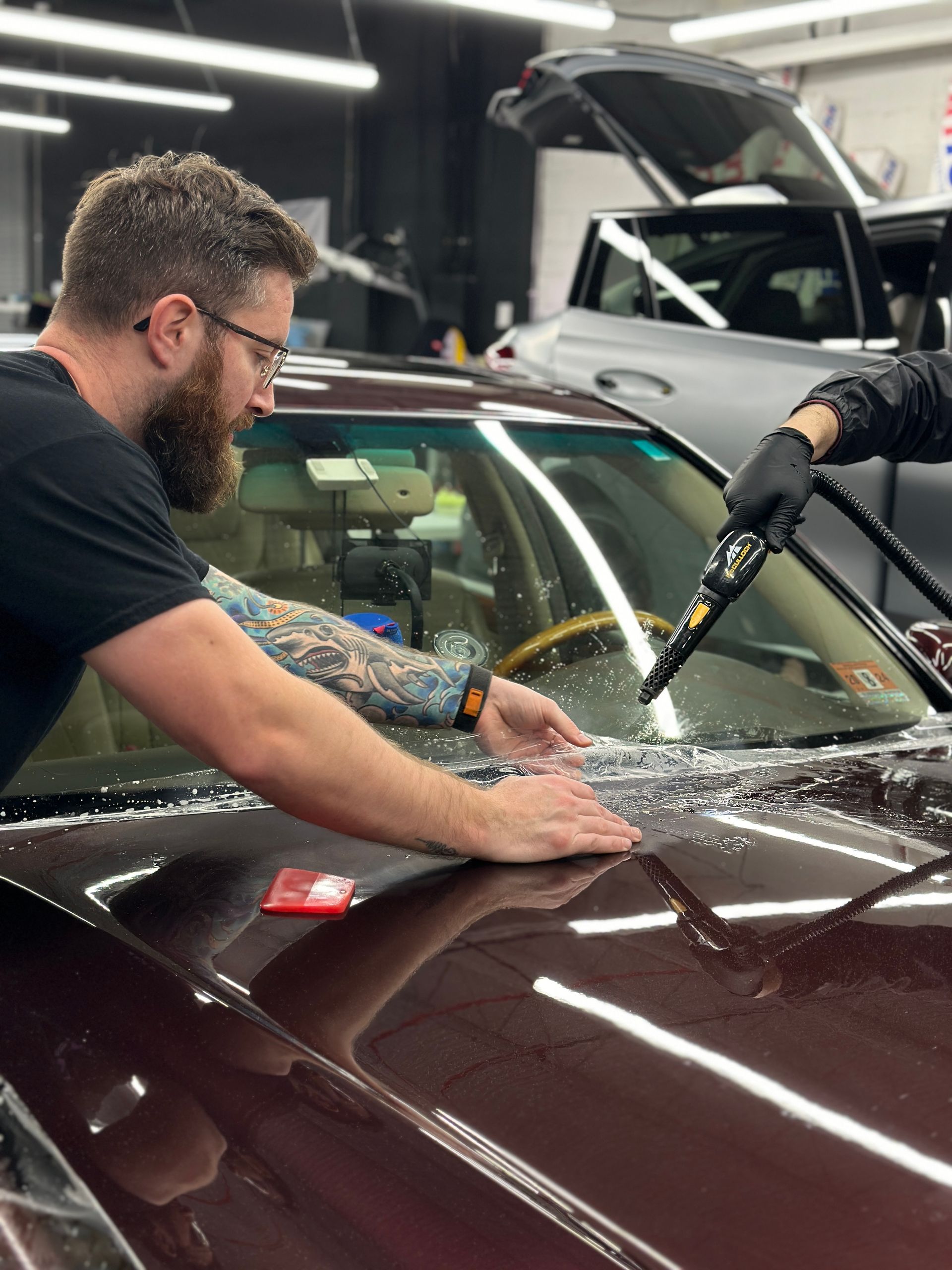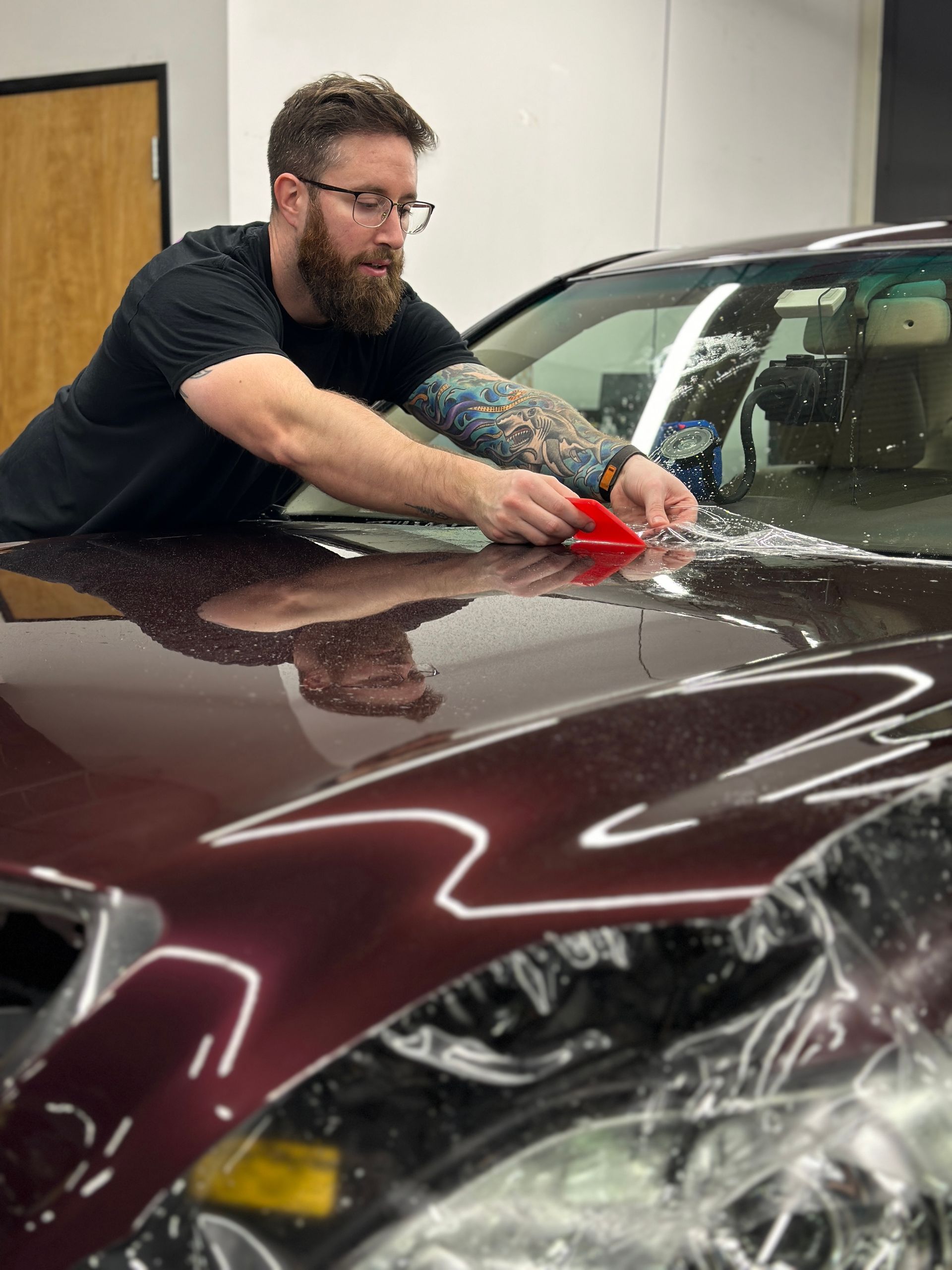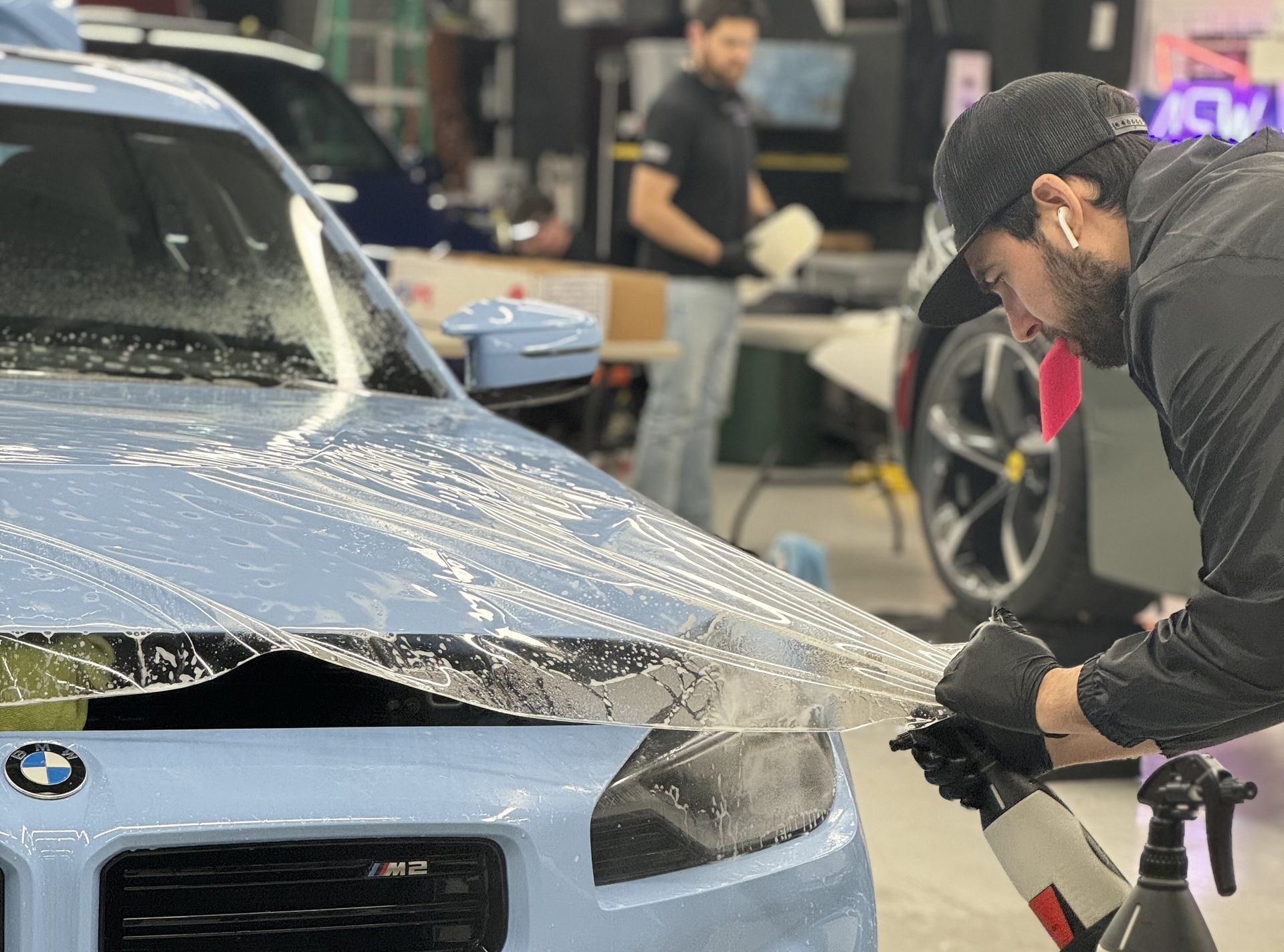Understanding the Impact of PPF on the Durability of Car Paint
GET A FREE ESTIMATEWhen it comes to keeping your car looking brand new, a paint protection film might just be the unsung hero you didn't know you needed. Many people pour money into fancy paint jobs, only to see them fade and chip over time due to daily wear and tear. But what if there was a way to combat that? Paint protection film is a transparent shield that shields your car's paint from scratches, UV damage, and all sorts of muck life throws its way.
Paint protection film significantly enhances the durability of car paint by acting as a barrier against environmental damage, chips, and scratches. However, it’s crucial to ensure proper installation, as poor application techniques can lead to issues such as trapped air or residue that could potentially harm the underlying paint over time.
What is Paint Protection Film (PPF)?
Paint Protection Film, commonly referred to as PPF, is a transparent, high-performance thermoplastic urethane film that acts like a suit of armor for your vehicle's exterior. Imagine applying a thin yet tough layer that can withstand the daily wear and tear of driving. This ingenious creation is designed to guard your car's paint against a multitude of external threats, such as road debris at high speeds, UV rays that can cause fading over time, and chemical contaminants that could eat away at the paint’s sheen.
Some of the most popular brands in the paint protection film arena are known for their exceptional quality and performance. These films are frequently applied to high-impact areas—like the hood, bumpers, and mirror backs—where damage is most likely to occur. One of the remarkable features of a paint protection film is its self-healing ability. Picture this: a small scratch appears on your car due to an unexpected tap from a passerby’s shopping cart. Instead of remaining a blemish, heat—whether from sunlight or warmth generated by washing your car—promotes the film to 'heal' itself, making minor imperfections vanish almost like magic. This not only preserves your car’s aesthetic but also ensures it maintains its value over time.
How PPF Shields Car Paint
A paint protection film acts as an invisible fortress for your vehicle, providing a resilient layer against threats that can mar the beauty of your car's finish. It protects against small rocks, debris, and environmental contaminants—common culprits behind paint chipping and deterioration. Think about those days when you're cruising down a gravel road or navigating a construction zone; every bump and pebble could potentially ruin your paint job. With PPF, you have an extra layer of assurance.
The unique construction of a paint protection film absorbs the impact from small road debris, effectively preventing anything from making direct contact with the paint surface. This quality becomes especially crucial when driving in areas prone to such hazards, as it significantly reduces the chances of chips and scratches that could otherwise require costly repairs. Here’s how PPF excels in shielding car paint:
- Impact Resistance: The film is specifically designed to absorb hits from small debris, acting as a barrier between your vehicle and potential harm.
- UV Protection: By blocking harmful ultraviolet rays, a paint protection film helps prevent paint oxidation, which can fade colors and dull finishes over time.
- Chemical Resistance: The film adds a layer of protection against pollutants and chemical etching commonly found in urban environments or agricultural areas.
Comparing PPF with Other Coatings
One of the most noticeable aspects of choosing between paint protection film and other coatings like ceramic or wax lies in their respective durability and overall effectiveness.
- Ceramic Coating vs. PPF: Ceramic coatings bond with the car’s paint on a molecular level, offering impressive long-term protection from environmental elements. However, they fall short when it comes to impact resistance; they can't withstand the same physical hits that PPF can. Imagine driving your car through a gravel-covered road—ceramic coatings may leave your paint vulnerable to chips, while a paint protection film acts as a robust buffer against those flying rocks.
- Wax vs. PPF: Another contender in the world of car protection is wax, which offers a classic solution many are familiar with. While wax provides a lovely gloss and UV protection, it's important to recognize its limitations compared to PPF. Wax generally needs reapplication every few months, reducing its longevity and ongoing effectiveness. Frequent waxing ends up becoming not just a chore but an ongoing expense! Wax also lacks the enduring protection of a paint protection film. It doesn't create that physical barrier necessary to fend off unwanted scratches or dents.
Installation and Upkeep Tips for PPF
Professional PPF Installation
The journey to maintaining your vehicle's flawless appearance with paint protection film starts right from installation. Opting for professional installation can significantly enhance the results. Expert technicians armed with the right tools and skills not only ensure a precise fit but also prevent common issues like bubbles or misalignment. For an ideal outcome, seek professionals who specialize in paint protection film applications. A trained technician will have access to appropriate equipment and techniques that can eliminate potential errors during installation.
Cleaning and Maintenance
Once your paint protection film is expertly installed, the next step is keeping it pristine through proper cleaning and maintenance. Regular washing cannot be emphasized enough—using mild, pH-balanced car soaps in conjunction with soft microfiber cloths works wonders for removing dirt without risking damage. This gentle approach preserves the integrity of the PPF, promoting longevity and overall durability. It’s essential to stay away from harsh chemicals or abrasive materials; using vigorous scrubbing pads or strong solvents can create scratches or damage the protective layer itself.
Additional Tips
Besides regular washing, consider scheduling annual inspections with professionals who can assess wear and tear on your PPF. These evaluations help catch any minor issues early before they become larger problems. Keeping your vehicle in a garage or shaded area limits exposure to harsh UV rays that may cause accelerated degradation over time. By focusing on professional installation coupled with diligent upkeep practices, you can confidently navigate through the world of PPF protection. This commitment not only leads to an unblemished paint job but also prepares you for an exploration into both the benefits and limitations associated with this protective solution.
Advantages and Drawbacks of PPF
Paint protection film can enhance your vehicle’s lifespan and appearance, but like any protective option, it has its own set of benefits and drawbacks. Let’s explore both the positives and the considerations when choosing PPF for your car.
- Self-Healing Properties: One of the most remarkable aspects of paint protection film is its self-healing feature. Minor scratches, like those from brushing against bushes, can disappear with warmth or over time. This quality helps your vehicle maintain a flawless finish, making it look new for longer.
- Defense Against Environmental Hazards: A paint protection film provides a strong shield against harmful elements such as acid rain, bird droppings, and tree sap. These substances can damage your car’s paint, but PPF acts as a barrier, preserving the paint’s quality. This protection is especially valuable for cars exposed to outdoor elements regularly.
- Resale Value Boost: Vehicles with paint protection film tend to retain a more appealing look over the years, which can enhance their resale value. Prospective buyers often appreciate the added protection, viewing it as a sign of responsible care. For many car owners, this investment pays off when it’s time to sell.
- High Initial Cost: The primary drawback of PPF is the cost, which ranges from $500 to $6,000 depending on vehicle size and coverage. This upfront expense can feel daunting, especially when compared to alternatives like ceramic coatings, which often cost less initially. Those on a budget may prefer other options that offer some protection at a lower price.
- Potential Yellowing Over Time: Older paint protection films sometimes develop a yellowish tint due to prolonged exposure to UV rays, which can impact the car’s appearance. While recent advancements have improved UV resistance, it’s still a consideration for long-term PPF users. Regular maintenance can help, but yellowing may still be a concern for some.
Choosing the right protective solution for your vehicle depends on your priorities and budget. Weighing the benefits of paint protection films longevity and protection against their cost and potential drawbacks can help you make an informed decision for preserving your vehicle's beauty and integrity.
Long-Term Benefits of Paint Protection Film
In terms of long-term benefits, a paint protection film can truly make your car feel like new for years. This aspect becomes particularly important if you own a high-end model or are leasing a vehicle where paint quality can dramatically affect resale value. A well-maintained paint job can enhance aesthetics and maintain market value. In fact, with adequate protection from PPF, many car owners notice far fewer instances of fading due to UV exposure—an issue that typically affects unprotected paints and clear coats.
Studies show that cars equipped with PPF exhibit a remarkable 70% reduction in paint damage from environmental factors compared to those without protective coatings. The impact of paint protection film goes beyond just preservation; it's about maintaining that showroom shine and extending the life of your investment. Therefore, while opting for paint protection film entails an initial cost, consider it a wise decision for protecting the beauty and integrity of your vehicle over time.
Trusted Paint Protection Film Experts in Fair Lawn, NJ
Safeguard your vehicle with Automotive Specialty Wraps, the
trusted paint protection film (PPF) experts in Fair Lawn, NJ. Our high-quality PPF installation provides an invisible shield against scratches, rock chips, and daily wear, preserving your car’s flawless finish and maximizing its resale value. With precision application by our skilled team, this film delivers unmatched durability and clarity, ensuring your vehicle remains showroom-ready. Contact us today to find out how our paint protection film solutions can keep your car looking pristine, no matter where the road takes you. Call us at (862) 268-2163 to get started!






